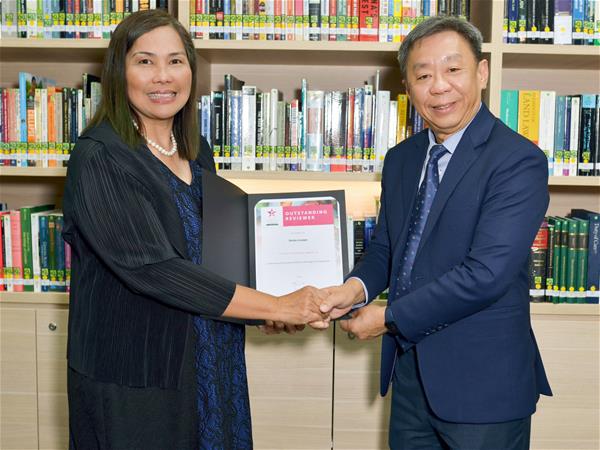Associate Professor Sheila Conejos from the SUSS School of Science and Technology has been awarded the “Outstanding Paper” and “Outstanding Reviewer” titles at the "2023 Emerald Literati Awards", as part of Emerald Publishing’s 30th Anniversary celebration. The Emerald Literati Awards, highly esteemed in the academic community, have been dedicated to recognising the significant contributions of authors and reviewers in publishing journals, books, and research over the past 30 years.

Professor Tan Tai Yong, SUSS President (right), presented the 2023 Emerald Literati Awards to Associate Professor Sheila Conejos, Head, Facilities Management with Minor, Facilities & Event Management and Graduate Diploma in Facilities Management Programmes, SUSS School of Science and Technology (left), winner of the Outstanding Paper and Outstanding Reviewer awards.
The Outstanding Paper Awards are chosen by a journal editorial team that reviews the papers on criteria that "include their impact on generating real change beyond academia, a contribution of something new to the body of existing knowledge, and relevance to the practice and future research, with excellent structure and presentation, well-written rigour, relevance to practice and further research, and got the 'x-factor' which makes the paper stand out from the rest" (Emerald Publishing, 2023).
The award-winning article, "Design for maintainability tool for nano-façade coating applications on high-rise facades in the tropics" was published in 2021 in the journal "Built Environment Project and Asset Management." The article was co-authored with Professor Aristotle Ubando at the Department of Mechanical Engineering, De La Salle University, Philippines, and Professor Michael Yit Lin Chew at the Department of the Built Environment, College of Design and Engineering, National University of Singapore. The paper highlights the development of the design for maintainability (DfM) tool that evaluates the maintainability potential of nano-facade coating applications on high-rise facades with concrete and stonemasonry finishes and curtain walls. Building maintainability is one of the sustainability indicators due to its overarching impact on the building function, its users, and the environment (ISO 21929-1). Thus, the design for maintainability research is timely. It will lead towards the long-term saving of facade maintenance costs while ensuring sustainability, effective performance, and high aesthetic value, as well as minimising risks and resource consumption. The practical and theoretical implications of the research are the development of the DfM tool as a checklist and scoresheet to guide designers and allied practitioners in the application of nano-façade coatings in tropical areas to reduce defect occurrences and maintenance cost as well as ensure the maintainability potential of the nano-facade coating right at the design stage.
Associate Professor Sheila Conejos also won the 2023 Emerald Literati Outstanding Reviewer Award, selected by the International Journal of Building Pathology and Adaptation editorial team from Emerald Publishing. Reviewers are essential and add value to the scholarly publishing process through the peer review process by verifying the research’s rigour and impact. The Outstanding Reviewer Award acknowledges the contribution made in ensuring that every paper published genuinely impacts the academic field.
Associate Professor Sheila shared:
"I am grateful to receive the Outstanding Paper and Outstanding Reviewer awards at the 2023 Emerald Literati Awards. I am honoured to have received three Emerald Literati Awards; the first accolade was in 2018 when my paper was highly commended. This recognition will inspire me and, hopefully, my fellow researchers to continue one's passion for academic research and maintain the highest standards of excellence in scholarly work.I look forward to continuing my research, teaching, and peer review activities with tremendous enthusiasm and dedication in the coming years." I am also grateful to all my research collaborators and colleagues from diverse institutions who have recognised my contributions.
Read the award-winning paper here.